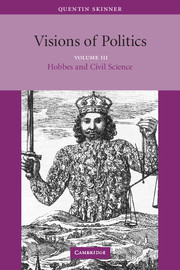Book contents
- Frontmatter
- Contents
- General preface
- Full contents: Volumes 1–3
- Acknowledgements
- Conventions
- 1 Introduction: Hobbes's life in philosophy
- 2 Hobbes and the studia humanitatis
- 3 Hobbes's changing conception of civil science
- 4 Hobbes on rhetoric and the construction of morality
- 5 Hobbes and the classical theory of laughter
- 6 Hobbes and the purely artificial person of the state
- 7 Hobbes on the proper signification of liberty
- 8 History and ideology in the English revolution
- 9 The context of Hobbes's theory of political obligation
- 10 Conquest and consent: Hobbes and the engagement controversy
- 11 Hobbes and his disciples in France and England
- 12 Hobbes and the politics of the early Royal Society
- Bibliographies
- Index
1 - Introduction: Hobbes's life in philosophy
Published online by Cambridge University Press: 05 September 2012
- Frontmatter
- Contents
- General preface
- Full contents: Volumes 1–3
- Acknowledgements
- Conventions
- 1 Introduction: Hobbes's life in philosophy
- 2 Hobbes and the studia humanitatis
- 3 Hobbes's changing conception of civil science
- 4 Hobbes on rhetoric and the construction of morality
- 5 Hobbes and the classical theory of laughter
- 6 Hobbes and the purely artificial person of the state
- 7 Hobbes on the proper signification of liberty
- 8 History and ideology in the English revolution
- 9 The context of Hobbes's theory of political obligation
- 10 Conquest and consent: Hobbes and the engagement controversy
- 11 Hobbes and his disciples in France and England
- 12 Hobbes and the politics of the early Royal Society
- Bibliographies
- Index
Summary
With this third and concluding volume, I turn from Renaissance theories of self-government to their leading philosophical opponent, Thomas Hobbes. As we shall see, Hobbes was nurtured in the humanist ideals with which I was chiefly concerned in volume 2. But he went on to repudiate his upbringing and, in developing his theories of freedom, obligation and the state, he sought to discredit and supersede some of the most fundamental tenets of humanist political thought. Reacting above all against the Renaissance predilection for self-governing city-republics, he constructed a theory of absolute sovereignty grounded on a covenant specifically requiring that each one of us ‘give up my Right of Governing my selfe’. The aim of this Introduction will be to trace the process by which Hobbes arrived at these anti-humanist commitments, to examine the resulting elements in his civil science and to consider their place in his more general scheme of the sciences.
To begin at the beginning. Thomas Hobbes was born on 5 April 1588 in Westport, a parish adjoining the town of Malmesbury in Wiltshire. He was the second son of another Thomas Hobbes, curate of the neighbouring and all too aptly named parish of Brokenborough. The elder Hobbes appears to have found his life altogether too much for him. A man of little education who could barely read the church services, he played cards all night, fell asleep during the sermon, became notorious for drunken and quarrelsome behaviour and eventually fled to London in 1604 after picking a fight with another local clergyman.
- Type
- Chapter
- Information
- Visions of Politics , pp. 1 - 37Publisher: Cambridge University PressPrint publication year: 2002



